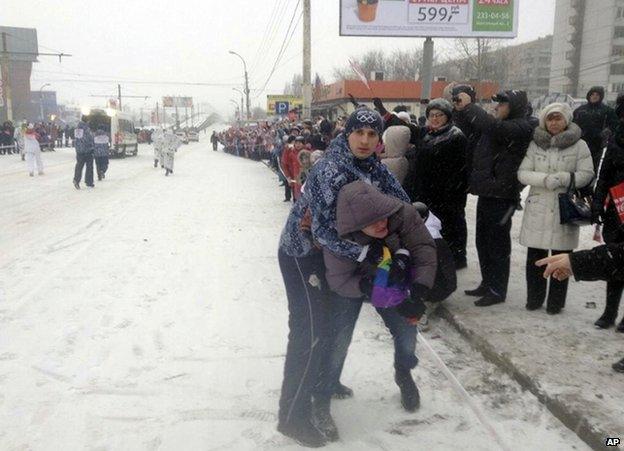Winter Olympics: Putin 'friendly' with gay people
- Published
Vladimir Putin: "I am not prejudiced in any way... I would definitely talk to them."
President Vladimir Putin has defended Russia's law on "gay propaganda" ahead of the Sochi Olympics but insisted he was not prejudiced against homosexuals.
Gay people faced no discrimination at work or in society in Russia, he told BBC One's Andrew Marr Show, and the new law did not harm anybody.
"I myself know some people who are gay," he said. "We're on friendly terms. I'm not prejudiced in any way."
Gay rights campaigners have urged a boycott of the winter games.
The controversial legislation passed in June prescribes fines for anyone providing information about paedophilia and homosexuality to people under 18.
Critics say the amendment's loose wording, and its free interpretation by the authorities, effectively make any kind of public gay rights event in Russia impossible.
Some national leaders have indicated they will not attend the games, which run from 7 to 23 February.
US President Barack Obama pointedly announced he was sending an Olympic delegation that includes several openly gay sports figures, among them tennis legend Billie Jean King.
Gay people honoured
"If you want my personal attitude, I would tell you that I don't care about a person's sexual orientation," Mr Putin told Andrew Marr in Sochi.
Famous gay people like the British singer Elton John were popular in Russia, he said.
"I've honoured several members of the gay community in this country but for their personal achievements, regardless of their sexual orientation," he added.
Mr Putin also pointed out that many other countries banned homosexual relations.
"There's no danger for individuals of this non-traditional sexual orientation who are planning to come to the games as visitors or participants," he said.
Hate crimes
Human rights campaigners have noted an alarming rise in hate attacks on gay people in Russia in recent years while reporting of homosexuality in the state media has been largely hostile or negative.

Gay rights protester Pavel Lebedev tried to disrupt the Olympic relay in Voronezh
Critics of the Kremlin accuse it of scapegoating gay people as a way of cementing Mr Putin's hold on power since his re-election in 2012 amid mass anti-government protests.
Nonetheless, one openly gay US athlete who is a self-confessed Russophile, Johnny Weir, told Reuters news agency this week he could not support the Sochi boycott calls.
The figure skater, who had hoped to compete himself but is recovering from injury, argued that an issue which affects a minority group should not ruin a "lifetime of sacrifices" made by thousands of athletes.
"I've come under so much hate and scrutiny from within my own LGBT community for my views on the Olympics," the former Olympian said.
"But as somebody who watched my parents sacrifice everything so that I had at least one chance of making the Olympics, I could never boycott the Olympics whether they be in Pyongyang, in Uganda, in Iran or Mars."
Meanwhile, in the south Russian city of Voronezh, security guards detained a gay rights protester for unfurling a rainbow flag during the Olympic torch relay on Saturday.
"Hosting the games here contradicts the basic principles of the Olympics, which is to cultivate tolerance," Mr Lebedev said.
- Published17 January 2014
- Published18 January 2014
- Published17 January 2014
- Published17 January 2014
- Published13 August 2013
- Published19 January 2014
- Published30 December 2013
- Published4 January 2014